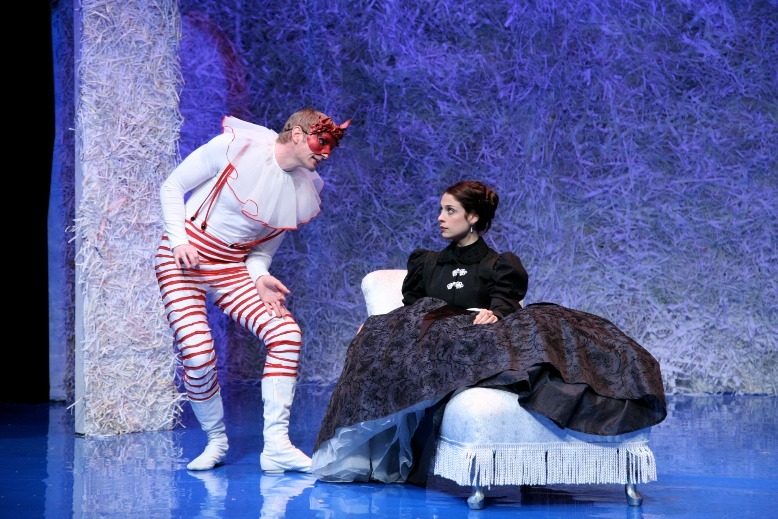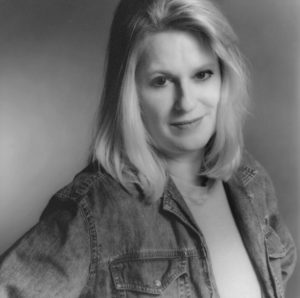
The Shakespeare Theatre of New Jersey—which earned a much-deserved space on New Jersey Monthly’s 52 Things You Must Do in New Jersey list—is celebrating its 60th anniversary this year.
The upcoming season marks the first time since the start of the Covid-19 pandemic that the theater, which is located in Madison, is performing a full lineup of five mainstage performances—Enchanted April (June 8-26), The Metromaniacs (August 17-September 4), The Caretaker (September 21-October 9), Two by Childress, Two One-Acts by Alice Childress (October 26-November 13) and Twelfth Night (December 7-January 1)—and one outdoor show at the theater’s beloved space under the sky, Much Ado About Nothing (June 29-July 31). The 60th anniversary gala is taking place on Saturday, April 23.
“For people who love Shakespeare, there’s Shakespeare. For people who don’t like Shakespeare, there’s a lot of non-Shakespeare,” says longtime artistic director Bonnie J. Monte. “I think that our main goal is to get our audiences back again, and to bring them the kind of thrilling experience that only live theater can provide. It’s just not the same as looking at a computer screen.”
Monte spoke with NJM about the theater’s history and future showing classic and classic-inspired plays to local theatergoers.
What does it mean for the Shakespeare Theatre to be celebrating 60 years?
Sixtieth anniversaries are not particularly remarkable in certain spheres. But certainly in the world of theater, making it to 60 is quite an accomplishment. Keeping theaters alive these days is a very difficult thing, made even worse by the pandemic.
What’s also remarkable is that this is a theater that has only ever had two artistic directors. … It was founded by two gentlemen, Paul Barry and Phil Dorian, back in 1963. Paul Berry was the artistic director up until October of 1990. And then I took over, so I’ve been here for 32 years. So that’s really unusual. And what that’s been able to do is give the company a really strong degree of continuity.
Because we’ve been around so long and because we re-infused our mission back in 1990 to include an equal focus on education, we’ve really been able to affect the education landscape in New Jersey pretty remarkably over the years.

Monte has been the artistic director of the Shakespeare Theatre of New Jersey for 32 years. Photo courtesy of the Shakespeare Theatre of New Jersey
What makes makes the theater unique?
I think that we’re the only theater totally dedicated to classic work. Obviously, there’s a huge focus on Shakespeare, we are the go-to Shakespeare theater in the state. And we’ve expanded the mission over the years to include new work that is either inspired by the classics, or is in some way derivative of the classics. While a lot of people think that we just do Shakespeare, nothing could be further from the truth. We do classical authors from all over the world from all time periods, but we also do a fair degree of new work. That includes what we consider contemporary classics. For example, this coming season, we’re doing two plays by
Alice Childress. She was a black female writer from the 1940s, ’50s and ’60s, and her work has stood the test of time. … We’ve got this special mission to bring what we would call buried classics to life for our audiences.
How did the theater shift gears during the pandemic?
During the pandemic, we did manage to do quite a bit of work outside. We started a whole online program where we were able to do online content called Pandemic Playhouse. We were able to reopen briefly in the winter for a holiday show. But Omicron, like most theaters, shut us down early.
How else did Covid affect the theater?
Thank goodness for both the federal government and the state government stepping up and helping the arts institutions through a huge variety of relief grants. That’s what got most of us through this and allowed us to come out of this thing still alive. That’s another way that makes the 60th anniversary so remarkable. There were a number of companies that just couldn’t make it through the pandemic. So, in the scheme of huge dilemmas, we all feel quite proud that we survived one of the toughest ones you could imagine. We kept thinking about Shakespeare and how the plague shut down the theaters in England on and off for a number of years. And we kept thinking, ‘Well, if they’ve managed it so can we.’
One play being performed this year is Enchanted April, which was written following the 1918 Spanish flu pandemic. What was the reasoning behind picking such a seemingly timely play and what do you hope the audience gets out it?
It’s interesting because I scheduled this play three times now and I feel like the universe kept making us wait on purpose, because there could not be a more timely opportunity to do this play. It is a play about the fact that the Spanish flu pandemic devastated the world, as did World War I. So the play is really about the reemergence of life, in a sense, and people coming out of an incredibly bleak situation. World War I, in addition to the pandemic, killed off a huge amount of particularly young men in Britain at the time, and the play takes place in England and in Italy. It’s an incredible story about reawakening and finding joy in life again. I think that watching that story, which took place over 100 years ago, will be very uplifting and inspiring for people when they see it on our stage. It’s very fun. It’s extremely funny, it’s very moving, it’s got a delightful cast of characters. And it’s full of surprises.

The F.M. Kirby Shakespeare Theatre is pictured at night. Photo by Andrew Murad
How has the Shakespeare Theatre evolved in 60 years?
A huge amount. It basically started as a very small operation. It started down in Cape May, so it’s evolved geographically, certainly. The first 10 years, there was a fairly gypsy-like existence, in so much that they had to keep changing performance spaces. But then in 1972, Drew University invited the theater to take up residence on campus, and so Drew has been our landlord for the past 50 years, and the ability that we had back in the 1990s to renovate and expand the theater made the performance space finally competitive with other performance spaces of other theaters in America. It’s a beautiful gem of a space. And then, in partnership with St. Elizabeth University, we were able to acquire a second performance space.
So we’ve really gone from a very tiny kind of community theater when it first started down in Cape May to one of the most prominent classical theaters in America. And we are a teaching theater. The professional training that occurs here is pretty profound. We have supplied the American theater scene with hundreds and hundreds of emerging professionals over the years who have taken up their place in the American theater and made a big difference. We’ve gone from a tiny theater to, not big in terms of budget or things like that, but big in terms of our influence.
What do you see in the future for the Shakespeare Theatre, whether it be in the next 10 years or even in the next 60?
That’s hard to tell, because who knows what the world is going to do? But I think right now, our focus is on slowly, but surely, making our way back to some semblance of what I would call a totally normal existence. That’s going to take most theaters and most arts institutions several years to recover. So recovery right now is the main goal.
What are you most looking forward to with this full-season return?
Being back in a rehearsal room with a group of actors to put on a season of plays that, all of which, to some extent, make up a larger piece of art. We don’t just look at shows individually, we look at the accumulation of what they do together in juxtaposition over the course of the season. We always try to take our audience on a fabulous roller coaster ride where we move from a comedy to a tragedy to a history, and there’s this wonderful variety of work, all of which speaks to the audience separately, but also in juxtaposition as I said, to each other. And that’s going to be really exciting again, to be able to do that.
